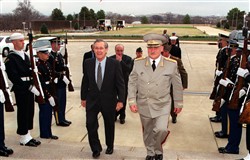|
WASHINGTON, May 15, 2002 – The Republic of Georgia in the Caucasus Mountains may seem a world away from New York City and Washington, D.C., but when terrorists attacked the United States on Sept. 11, the people of Georgia responded as neighbors.

Defense Secretary Donald H. Rumsfeld (left) escorts Georgian Defense Minister David Tevzadze through an honor cordon at the Pentagon on March 16, 2001. Following last year's Sept. 11 terrorist attack, leaders of the Republic of Georgia vowed to do their part in the war against terrorism. DoD photo by R.D. Ward.
(Click photo for screen-resolution image);high-resolution image available. |
|
Slightly larger than South Carolina, the former Soviet state of about 5 million people borders the Black Sea. It lies between Turkey and Russia and borders Armenia and Azerbaijan. Georgia was absorbed into the Russian Empire in the 19th century. Following the Russian revolution, Georgia was independent from 1918 until 1921, when it was forcibly incorporated into the Union of Soviet Socialist Republics. With the collapse of the Soviet empire, Georgia declared independence in 1991 and became a democratic republic in 1995. Internal disputes continue over the separatist regions of Abkhazia and South Ossetia. Led by President Eduard A. Shevardnadze, Georgia's government is committed to economic reform. U.S. State Department officials say Georgia stakes much of its future on the revival of the Silk Road, an ancient trade route between Europe and Asia. The United States has established economic, diplomatic and military ties with Georgia. In the wake of the Sept. 11 attack on America, Shevardnadze sent a letter to President Bush expressing his nation's condolences and condemning the "manifestation of barbarism and hatred." The Georgian Parliament released a statement declaring that the "grave crime" was more than a "national catastrophe" for America; it was a crime against humanity. "The ever-increasing scope and grasp of terrorism poses a serious threat to the whole of humankind," the statement read. "The tragedy of the American people should be perceived by any single state and individual as a crime committed against them personally." Members of Parliament vowed Georgia would do its utmost to contribute to the fight against terrorism. They called on all states and international organizations to "declare ruthless war against terrorism." As part of its global anti-terror effort, the United States military is now helping Georgian authorities enhance their counterterrorism capabilities and address the situation in the Pankisi Gorge. In 1999, Georgian officials admitted about 7,000 Chechen refugees who, Western observers say, undermine the country's security. Both Russia and the United States want Georgian authorities to regain control over the crime- ridden Pankisi Gorge region where Chechen separatists and armed militants allegedly linked to Osama bin Laden's al Qaeda terrorist network may be hiding. About 20 U.S. service members arrived in the Georgian capital Tbilisi on April 29 to launch the Georgia Train and Equip program. In all, the program will involve about 150 Americans and more than 2,000 Georgian soldiers. U.S. service members will train command center staff to build organizations that can create and sustain standardized operating procedures, prepare and execute training and operational plans and a property accounting system. U.S. trainers will also instruct four Georgian battalions in light infantry tactics, including platoon- level offensive and defense operations and basic airmobile tactics. On the 'equip' side of the program, Pentagon officials say the United States will provide military equipment and supplies, including uniforms, small arms and ammunition, fuel and construction material as well as training, communications and medical gear. "From the outset we have openly declared that we will participate in the anti-terrorist coalition," Georgian Defense Minister David Tevzadze said in a May 7 interview posted on EurasiaNet.org. "The help our American colleagues are providing will help us to solve Georgian internal problems and also to assist in international missions." The program "stands to help Georgia manage its own problems without outside help or involvement," he noted. "Second, it should be clear that it develops our integration with the structures of NATO. We have long participated in [NATO's] Partnership for Peace [training] program, as a result of which we have detachments trained to take part in the Kosovo peacekeeping force." After meeting with Tevzadze at the Pentagon May 7, Defense Secretary Donald H. Rumsfeld said that about 15 countries, including Turkey and Germany, have offered to assist Georgia and its minister of defense in various ways "in developing a better anti-terrorist capability for their armed forces." The United States and Georgia have a military-to-military relationship "that is really an expansion of the Partnership for Peace/NATO relationship," Rumsfeld said. "It's a multi-faceted relationship; it involves diplomatic and economic as well as security issues." Map and statistical information on the Republic of Georgia are located online in the CIA World Factbook 2001 at www.odci.gov/cia/publications/factbook/index.html.
|